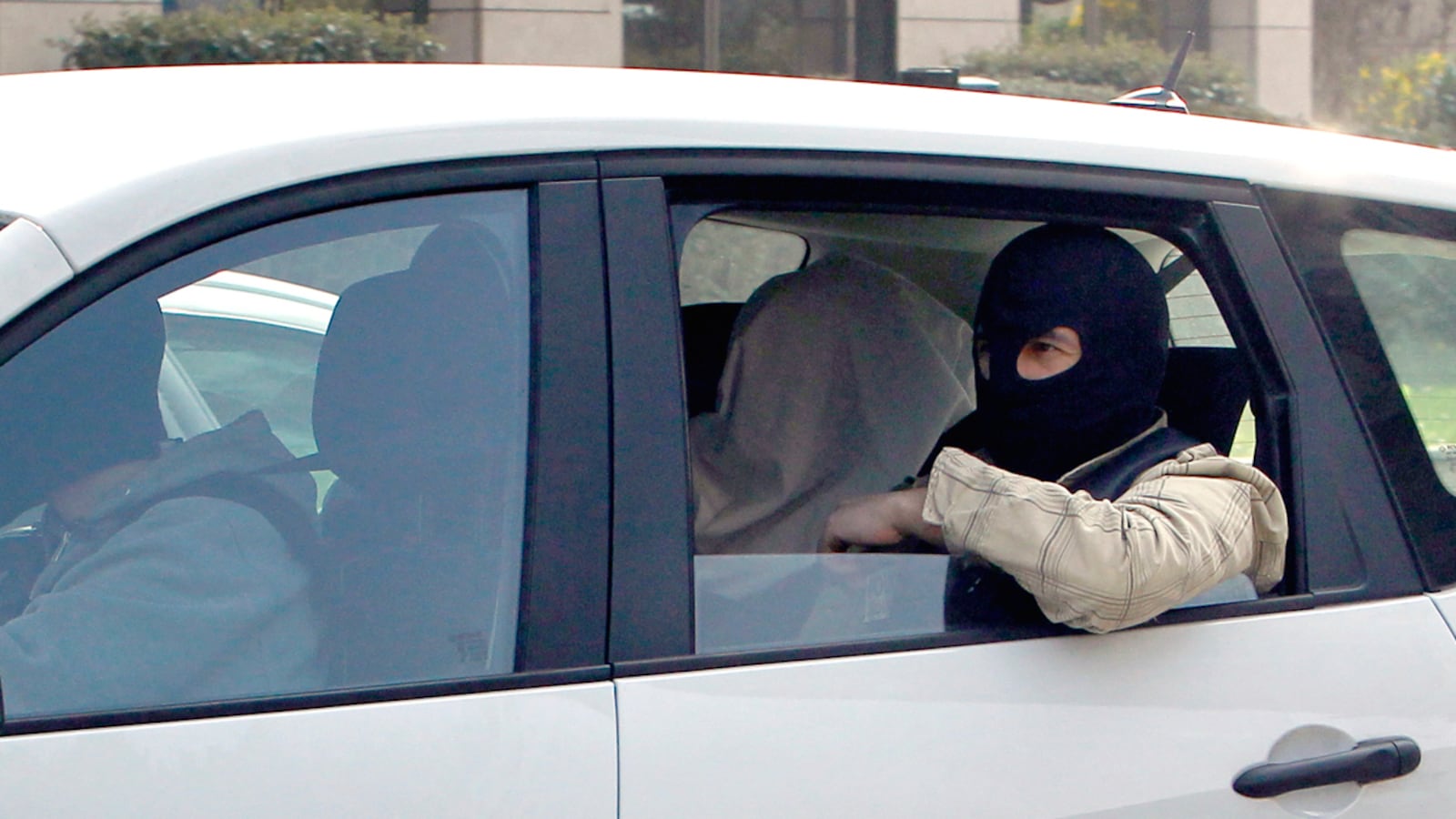French President Nicolas Sarkozy made his name on his tough-guy image. The straight-talking master of law-and-order posturing. France’s “top cop” keen to jog in NYPD apparel. Le Terminator. And so a bloody, breathtaking newsmaker in Toulouse a month before a major election, for all its horror, might at least provide a boost to his reelection hopes, surely? Not so fast.
Eight days after Scooter Killer Mohamed Merah was killed by police in a ferocious firefight, France’s hotly contested presidential election campaign continues. But the impact of the first terrorist attack on French soil in years does not appear, so far, to have had a dramatic impact on voters—despite a 32-hour standoff that saw France hold its breath, and a presidential campaign virtually suspended with only weeks to go, through manhunt, standoff, and firefight. Merah, whose eight-day motorcycle rampage killed seven people—three small children, a rabbi, and three paratroopers—was shot dead by a police sniper exactly a month before French voters will cast their first-round ballots on April 22. Sarkozy and far-right leader Marine Le Pen, the candidates many see as having the most to gain politically from such an event so close to an election, have pushed their dueling agendas in the wake of the killings. But experts insist French voters aren’t as interested in shifting their priorities as some candidates would like to think.
In campaign rallies this week, Sarkozy has spoken at length about the Toulouse “monster.” “To search for an explanation is to prepare oneself to excuse the inexcusable,” Sarkozy said at a rally in Nantes. Even as he talks tough on security and immigration on the stump to stave off far-right gains, he has criticized Marine Le Pen for using the Scooter Killer to justify anti-immigration rhetoric. (Indeed, on Monday, in an egregious slip of the tongue, Sarkozy explained that sowing confusion about the events in Toulouse would be “particularly odious,” since, “I remind you that two of our soldiers were... how would you say... Muslim, in any case in appearance, since one was Catholic, but in appearance.” The remark led the father of one of the paratroopers murdered in Montauban to accuse Sarkozy of trolling for Le Pen votes and imploring him on television, “Shut up, please. Let my son rest in peace. Let the other children rest in peace.”)

On another radio talk-show Friday morning, Sarkozy was asked for comment on pre-dawn police raids throughout the country (at least one with a television crew in tow) that saw 19 alleged Islamists with no known links to Merah taken into custody. “What you have to understand is that the trauma of Montauban and Toulouse was deep in our country. A little—I don’t want to compare the horrors—a little like the trauma that in the United States and New York followed September 11,” Sarkozy said in explanation.
The thing is, potential voters—or, at least, the pollsters who query them—aren’t so sure. Indeed, in a poll conducted March 22 and 23 (the day Merah was killed and the next day), only 53 percent evaluated the terrorist threat to France as “high,” one of the lowest rates registered since the IFOP firm began asking the question in 2001. (In contrast, the rate was at 78 percent in May 2011, after Osama bin Laden was killed.) “The fact that worry about the threat of terrorism is today at a historically low level leads us to think that, while the tragedy of Montauban and Toulouse left an impression and moved French people, it did not create psychosis about security,” reads IFOP’s report. (The worry is highest, notably, among supporters of Le Pen and Sarkozy’s parties.)
In the days between the Jewish school massacre and the funeral ceremony Sarkozy led for the soldiers Merah had gunned down, a sort of tenuous truce reigned. Candidates postponed rallies and media appearances, while Sarkozy was left to adopt a solemn tone and somber suits. Breaking, at least officially, from the campaign trail, the president could become the persona a candidate could only promise to be, a sort of protector of the nation. But the vicious sniping of an especially ugly campaign quickly resumed. Top candidates accused one another of exploiting the tragedy, while security experts raised tough questions about allegedly shoddy intelligence work and the imputed failure of the ultimate raid, when a suspect authorities sought to capture alive was killed. Sarkozy called the law-enforcement controversies “shameful.”
Only two hours after Merah was killed, Sarkozy—true to his habit of pitching new laws in the immediate aftermath of major (or even minor) news—appeared live on television to propose a law against those who regularly visit websites espousing terrorist ideas and another to make training in terrorist camps abroad illegal. Some observers pondered whether the Internet law would be unconstitutional. And it escaped no one’s notice that parliament is, in any case, on hiatus until after the election. (Prime Minister François Fillon floated the notion that not tabling the new legislation would be an obstructionist opposition’s fault. But Sarkozy later conceded the laws couldn’t be passed until after his reelection, if he wins.)
Polls in the wake of the incidents show a majority of French people approved the tone adopted by President Sarkozy (70 percent) and his Socialist challenger François Hollande (55 percent) during the Toulouse events. But pollsters say the electoral dynamic has hardly been affected. Figures vary—France has at least seven major polling firms, few presenting the same numbers—but Sarkozy is slightly ahead of Hollande in the first round, although generally within the margin of error. Hollande, meanwhile, retains a wide, if narrowing, lead for the run-off, May 6, around 54 percent to Sarkozy’s 46. Marine Le Pen remains a distant third, if not fourth, in most polls.
Indeed, pollsters say, security issues rated low on the list of priorities for French voters before the Toulouse incidents and still do. Marine Le Pen has most explicitly looked to link security and immigration in the aftermath of Toulouse, although Merah was born and raised in France. (Indeed, the Algerian government on Thursday turned down a request to bury Merah in his father’s native village.) Polling firm BVA ranks security and immigration as tied for eighth, unchanged after the Toulouse drama, in a list of 14 topics that French voters say will most influence their vote. Security (3 percent) and immigration (3 percent) lag far behind purchasing power (25 percent), unemployment (17 percent), economic growth (14 percent), and even France’s public debt (11 percent) as voters’ top concern. In the same poll, 81 percent said the Toulouse events would have little or no impact on their own vote. Interestingly, though, 51 percent believed the events could have an important effect on the way other people vote.
In Sarkozy’s campaign rallies this week, he pursued an effort (begun before Mohamed Merah became a household name) to seduce voters away from Le Pen’s National Front, as he did successfully in 2007. In his latest speeches, Sarkozy seems to have found a new catch phrase. He repeatedly calls for an end to the “uncontrolled waves of migration”—seemingly forgetting that Sarkozy himself has been the pivot of French immigration control for the past decade, for five years as president and four as interior minister. In that time, the number of migrants allowed into France every year has been relatively stable. But on the campaign trail, Sarkozy has said there are “too many foreigners” in France and he promises to cut legal immigration in half, if elected.
“We say to those who want to come that we accept your share of difference. But us, we don’t want to change the values that are ours, that our parents and grandparents passed on to us, and that we want to pass on in turn to our children,” Sarkozy declared this week in Nantes, a curious remark from a man whose father, three grandparents, and the mother of his six-month old were all born abroad. On the trail, Sarkozy lambastes an entirely fictional 60-year-old immigrant he imagines has expressly come to France to immediately collect a larger minimum old-age allowance than that of a retired farmer’s wife who has spent her whole life here (a fantasy that is already legally impossible for at least three reasons—and one that presumes aging foreigners are pining to suddenly leave home and live beneath the poverty line in France). Sarkozy promises, stirring up crowds, that if he is elected no immigrant will have access to such benefits before living on French soil for a full 10 years (a restriction that, pundits note wryly, already exists).
At a campaign rally in Nîmes on Thursday night, Sarkozy worked the crowd. “They” want to “stop us from talking about subjects that preoccupy you,” he argued. “Because in this campaign there are the subjects we are allowed to talk about—the ones that interest the elites... and the subjects we aren’t allowed to talk about. It’s not good to talk about these subjects because apparently they don’t interest you,” Sarkozy explained. “So every night I’m talking to you about subjects you’re not interested in!” he joked, listing off security and immigration among others. “Me, I believe they don’t interest you.... They impassion you!”
Indeed, while the experts say security issues won’t make this election, Hollande’s rival’s newfound energy and jokey bravado might be the cause for concern. As Sarkozy asked the crowd in Nîmes on Thursday night, “I ‘exploit security’? Have you ever heard anything more ridiculous?”






